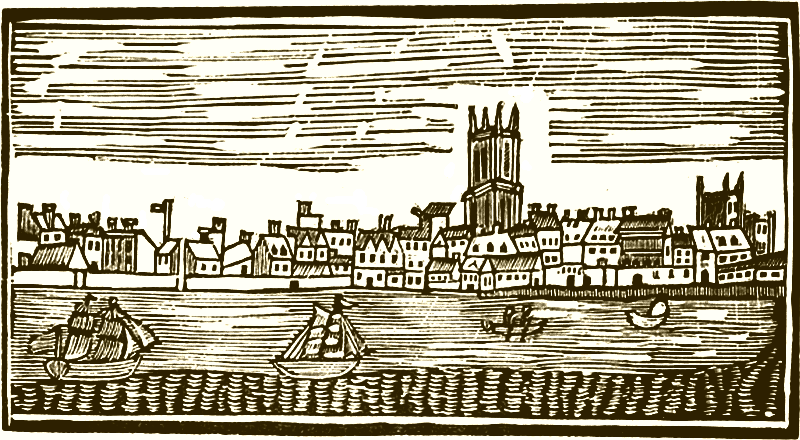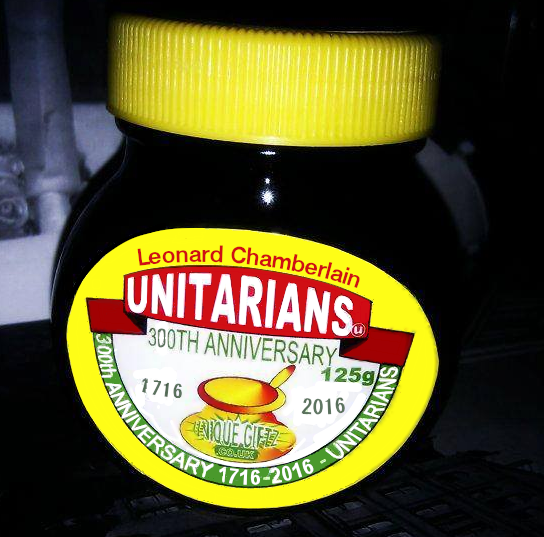
Leonard Chamberlain worked close by the Holy Trinity Church (visible)

How did Leonard Chamberlain make his money and what changes came in the Presbyterian line? Asks Adrian Worsfold.
 Leonard Chamberlain was a woollen draper. Today this would mean he was in the fashion business. It meant then that he was trading regionally and overseas in wool products as a merchant. Wyke (Hull) was set up to trade wool. A woollen draper might have had a shop, or a warehouse. Chamberlain also married into money.
Leonard Chamberlain was a woollen draper. Today this would mean he was in the fashion business. It meant then that he was trading regionally and overseas in wool products as a merchant. Wyke (Hull) was set up to trade wool. A woollen draper might have had a shop, or a warehouse. Chamberlain also married into money.
He traded before industrialisation, it beginning about 1760 for sure and 1720 at the earliest, and therefore pre-capitalist. Factories developed using landless labour after agricultural enclosures and huge banking funds from slavery.
So Chamberlain was still part of mercantilism. This is not open competition but privileged trading. Yet Max Weber said this Protestant Ethic was also the Spirit of Capitalism (saving, investment, not consumption). So this economic setting is in transition. We see this at Bowl Alley Lane among its wealthy traders, from before the Unitarian period (unambiguously from 1806). There is Benjamin Blaydes, boss of the town's largest shipbuilding business, a merchant, a shipowner, owner of a ropemaking business and three times Mayor of Hull; Ralph Peacock is a wealthy merchant and member of Trinity House, and Joseph Pease, who introduces linseed crushing into the town, sets up Hull's first bank in 1754 and becomes wealthy enough to loan £1000 to Hull Corporation in 1770.
But look at the difference with Joseph Pease’s grandson, Joseph Robinson. Grandson Joseph was born in 1752, the only child of Joseph Pease's daughter Mary. She had married Robert Robinson, who was a merchant attending Cross Street Chapel, Manchester. Orphaned at five, Joseph Robinson was raised by his father's brother in Manchester and from 1764 went to Warrington (dissenting) Academy. In 1769 he was sent by his Hull-based grandfather to Holland for a commercial apprenticeship. When grandfather Pease's unmarried son Robert died, Joseph Robinson added the name Pease and took over the Pease business. When grandfather died, aged 90, he took over one of Hull's most substantial merchant houses.
Here's the difference. He expanded the business. Along with the major share of 'Pease's Old Bank', he invested in two seed-crushing businesses, whaling and inland transport. By the 1790s he was a heavy investor in the Calder-Hebble Navigation, the Driffield Navigation, and Rochdale Canal, and in local turnpike schemes. He bought in housing, and then inherited his uncle Robert's country estate at Hessle, rebuilding the old house in 1790. Only 16% of his income in the mid-1790s came from land and mainly from Hull than Hessle (Hesslewood included a farm). Despite marrying the Anglican daughter of a Derbyshire squire, he retained his rational dissent and mildly Whig leanings. Robinson Pease could rise socially with an ease that Chamberlain's Puritanism prevented. Chamberlain instead chose to be buried in a place, Rowley, from where people had effectively fled to the American east coast back in 1638.
In Chamberlain's day, economists had believed there was a fixed wealth; English merchants, via State controls, subsidies, and monopolies, acquired that wealth as a surplus for the country’s metal bullion reserves. But Adam Smith in 1760 wrote that, by using free markets and division of labour, wealth would expand, and in 1817 David Ricardo analysed trade - comparative advantage so that a producer can export its most efficient produce to a country producing it even more efficiently so that all countries benefit. Chamberlain did not know this. After him the political struggle was towards free trade. In 1846, just after Parliament secured Puritan based trusts like Chamberlain's for Unitarians, the restrictive Corn Laws were repealed in favour of free markets.
Kermode, Jennifer Isobel (1990) The Merchants of York, Beverley, and Hull in the Fourteenth and Fifteenth Centuries, University of Sheffield thesis re-submitted, [Online], Available World Wide Web, http://etheses.whiterose.ac.uk/1848/1/DX194332_1.pdf.
Adrian Worsfold
Pluralist - Liberal and Thoughtful